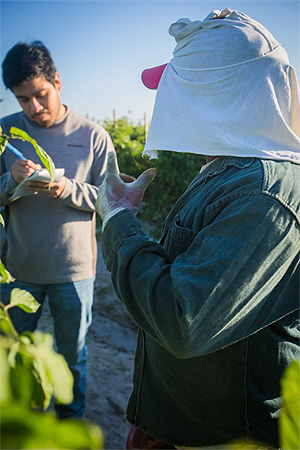
While Fair Food Program farms in Florida continue to raise the bar for human rights in the US agricultural industry, outrageous human rights violations on farms outside the Program continue to fester.
Why then has Wendy’s abandoned the Florida tomato industry altogether? And where are they buying their tomatoes today?
Last month, when consumers across the country called on Wendy’s to show farmworkers some love on Valentine’s Day and join the Fair Food Program, many Fair Food activists picked up their phones and called Wendy’s headquarters directly to express their concerns. What they heard was a bit of a shock, to put it mildly. Caller after caller was told that Wendy’s no longer purchases tomatoes from Florida. Here’s a typical report, this one from the Rev. Lynda Smith from the Unitarian Universalist Church of Columbus, Ohio:
I called Wendy’s (614-764-3100), explained that I was following up on the Valentines delivered this morning from the children and youth of the First UU Church of Columbus about fair treatment of tomato pickers. I was directed to a voice mail and just received a call back. The woman was Jane at ext 3015; she would not give me her last name, just said she was “from corporate.” She said that Wendy’s does not purchase tomatoes from Florida so the Fair Food Program does not apply to Wendy’s. I asked where Wendy’s does get their tomatoes from and she said she did not know. She then hung up the phone; she seemed very nervous.
… All of the Florida tomatoes purchased by Wendy’s supply chain cooperative come from suppliers who participate in the Fair Food Program, which means they have:
1. Adopted the Fair Food Code of Conduct
2. Agreed to implement a system of health and safety volunteers, which affords workers regular and structured input into the safety of their work environment
3. Agreed to an independent and verifiable complaint investigation and remediation mechanism
4. Agreed to have compliance with the program independently monitored
5. Agreed to a worker education program conducted on company premises and company timeWendy’s supports ongoing efforts by Florida tomato growers to improve working conditions for their workers… read more
So why then has Wendy’s decided to stop supporting the efforts of Florida tomato growers to improve working conditions for their workers? And where are they getting their tomatoes now?

From free rider to fugitive from farmworker justice…
While their earlier policy constituted a classic “free rider” abdication of responsibility, at least they were riding free on something. And not just something, but on the most widely-respected social responsibility program in US agriculture today, the Fair Food Program.
But now we have come to learn that Wendy’s approach has gone from bad to much, much worse. Not only does Wendy’s no longer buy tomatoes from Florida, but company representatives want their customers to believe that fleeing Florida signifies that the Fair Food Program “no longer applies” to Wendy’s. So while their former policy was hardly an acceptable defense for their refusal to join the Fair Food Program, Wendy’s position today is a flat-out rejection of the unprecedented efforts of Florida’s tomato growers to modernize working conditions for their workers.
It’s one thing to refuse to do your part to help improve conditions on Fair Food Program farms, but still purchase Florida tomatoes because you know they meet the highest human rights standards in agriculture. It’s an entirely higher degree of irresponsibility, however, to become a fugitive from those higher human rights standards in order to purchase tomatoes where none of the key elements of Worker-driven Social Responsibility — a worker-drafted code of conduct, worker-to-worker education, a 24-hour complaint line backed by a fast and effective complaint investigation and resolution process, an independent auditor with best-in-industry auditing protocols, and binding agreements with retailers that establish strict market consequences for failure to comply with the code — are present.
But you don’t have to take our word for it. Let’s take a look at life for farmworkers outside the walls of the Fair Food Program with a quick review of the headlines from the past six months, then you can be the judge of whether Wendy’s new policy is a move in the right direction.
Life outside the Fair Food Program…
From forced labor to sexual assault to inhumane living conditions, it’s anything but pretty out there. The following are three recent examples of the kind of abuses facing workers in the fields beyond the protections of the Fair Food Program.
1) “Six accuse Clewiston farm of human trafficking, say they were forced to work, threatened with guns,” Naples Daily News (8/31/14):
IMMOKALEE, Fla. – Six farmworkers, including four residents of the Immokalee area, have sued a farming company operating in Clewiston, its two owners and a crew leader saying they were victims of human trafficking — forced to work in the fields and threatened with guns or deportation if they complained.
The farmworkers, who are from Mexico and Guatemala and whose identities haven’t been disclosed, filed the federal lawsuit in April, arguing the defendants didn’t pay them for all the time they worked for C&C Agricultural Farms and did not treat them humanely. The workers said they had to work for 10 to 12 hours at a time in the Clewiston fields plus three to eight hours in a packing house during the harvesting season.
“Plaintiffs continued to work for defendants because plaintiffs and the families they support are financially desperate and also because they were afraid to quit or even complain,” the lawsuit says.
Ernesto Ruben Cordero, one of the company directors, and Reyes Tapia-Ortiz, a contractor who provided workers for the company and supervised four of the plaintiffs between July 2011 and February 2012, carried guns in the fields and threatened the workers when they complained, according to the lawsuit.
Tapia-Ortiz is also accused of sexually harassing one of the female workers and threatening to shoot the workers, who were in the country illegally, or get them deported if they stopped working for the company. Tapia-Ortiz also arranged the deportation of a worker who quit his job, according to the lawsuit…” read more
2) “Product of Mexico: Hardship on Mexico’s farms, a bounty for U.S. tables,” Los Angeles Times (12/14, a four-part series). Here below is an excerpt from our extensive analysis of the LA Times report:
… “The more protected they are, the less they work”
The scope of the report and the degree of abuse are so profound that it is almost overwhelming. The video below, which accompanies the online version of the first installment in the series, provides an excellent summary of the reporter’s findings:
The report pulls no punches, listing the abuses — and the structural forces behind their perpetuation — at the very top of the Sunday story:
The Times found:
* Many farm laborers are essentially trapped for months at a time in rat-infested camps, often without beds and sometimes without functioning toilets or a reliable water supply.
* Some camp bosses illegally withhold wages to prevent workers from leaving during peak harvest periods.
* Laborers often go deep in debt paying inflated prices for necessities at company stores. Some are reduced to scavenging for food when their credit is cut off. It’s common for laborers to head home penniless at the end of a harvest.
* Those who seek to escape their debts and miserable living conditions have to contend with guards, barbed-wire fences and sometimes threats of violence from camp supervisors.
* Major U.S. companies have done little to enforce social responsibility guidelines that call for basic worker protections such as clean housing and fair pay practices.
A conversation with a labor contractor, Luis Garcia, neatly sums up what appears to be the prevailing attitude of employers toward labor in the industry. After brushing off his own alleged history with forced labor — “They said I beat people. Lies, all lies,” Garcia said, bristling. “I wouldn’t be here today talking to you if it was true, would I?” — the contractor explains why, in his opinion, reform would be counterproductive: “The more protected they are, the less they work.” read more
3) “Farmworker Women Subjected to Rape, Coerced Sex, Groping and Verbal Abuse, Federal Agency Charges in Two Separate Lawsuits,” EEOC press release (8/29/14):
MIAMI – The U.S. Equal Employment Opportunity Commission (EEOC) filed two separate sexual harassment lawsuits yesterday afternoon — one against Windmill Farms Nursery, Inc., a plant material wholesaler and nursery located in Zolfo Springs, Fla., and another against Moreno Farms, Inc., a farming business with packing and distribution facilities in Felda, Fla. — the agency announced today…
… The EEOC charges that a male supervisor in Moreno Farms’ packaging facility engaged in graphic acts of sexual harassment, including regularly groping one female employee, demanding and having sex with her on three occasions, and threatening the employee with termination if she did not have sex with him. This supervisor ultimately terminated the employee because she refused to have sex with his brother, who supervised pickers working the fields adjacent to the packaging facility. The EEOC further alleges that the supervisor’s brother raped a female worker, and that the supervisor’s male assistant raped a different female worker… read more
It is important to remember, of course, that these headlines represent the extremes (to date) in terms of abuses taking place on farms beyond the protections of the Fair Food Program. But while they may be the extremes, these three cases are also only the tip of the iceberg of human rights violations across the agricultural industry as a whole. The vast majority of abuses go unreported, with desperately poor workers choosing to suffer wage theft, sexual harassment and other daily humiliations in silence rather than lose their jobs and risk trying to survive without income, security, and shelter.
Meanwhile, inside the Fair Food Program, thanks to the penny-per-pound premium and other reforms, wages are up and increasing with each new buyer to join the Program. And gross human rights violations like slavery and sexual assault are a thing of the past, because the economic consequences created by the zero-tolerance policy for those abuses — and the wall-to-wall monitoring of conditions by workers and auditors alike — have changed the game on Fair Food Program farms. If a farm boss tries that sort of thing, he will get caught, and if he is caught, the farm will be suspended from the Program, and lose the right to sell its tomatoes to some of the biggest buyers in the world. That has fundamentally changed the behavior of bosses in an world once known as “ground zero for modern-day slavery.” Even lesser abuses, like wage theft and health and safety violations, are now the exception rather than the rule. And when they do occur, workers have real recourse, a protected, fast, and effective complaint investigation and resolution process that allows the growers to address the immediate abuse and leaves behind systemic changes to prevent its recurrence.
Inside the Fair Food Program, life for farmworkers is getting better all the time. The quantitative results are measurable and real. Recognition of the Program’s unique power to eliminate longstanding human rights abuses runs from the White House to the United Nations. And the qualitative results, many of which come from workers themselves in the course of interviews with auditors from the Fair Food Standards Council, are poignant:
“I have been in the fields all my life, I have seen boys become men in the tomato fields, I have seen a great deal. And now I also see that things are better, now we are not treated like dogs – I am grateful to people like you. You are welcome here.” read more
Outside the Fair Food Program, however, life is harsh, and you’re pretty much on your own. Wendy’s has fled from the new world of Worker-driven Social Responsibility that is the Fair Food Program and, by its own admission, decided to take its vast tomato purchases to the old world beyond the Program’s reach, social responsibility be damned.
Where has Wendy’s gone? Your guess is as good as ours…
We’ll close this post with a question: In this world of unconscionable worker abuse, where do you think Wendy’s has gone to satisfy its substantial demand for winter tomatoes?
Given the volume they purchase for their all-American hamburgers, the options are limited.
Florida growers we talk to say Mexico, and that makes sense, because there really is no other source outside of Florida big enough from the months of November to May to meet the kind of demand Wendy’s brings to the table. And that’s ironic, because the very same web page that used to house Wendy’s defense of its refusal to join the Fair Food Program — a page which has been scrubbed clean of any mention of Florida tomatoes or the Fair Food Program — now ends on this note:
Wendy’s Supply Chain – A Commitment to Quality
Since we opened the first Wendy’s in 1969, we have been proud to source most of our food from American farmers and ranchers. It’s a partnership built on mutual respect with an unwavering commitment to quality. This is important, because “Quality is our Recipe.®”
Farming and running restaurants are both hard work. Our restaurants are successful because of our managers and crew members as well as workers on the farm, in the field and everywhere in between. Our goal is to provide our customers with quality and wholesome food, good value and “A Cut Above” experience every visit. With the support of our suppliers, we work to deliver that every day.
The sad truth is, we’ll probably never know where Wendy’s is buying its tomatoes today, now that it has decided to stop buying from Fair Food Program farms and stop buying from Florida growers altogether. Never, that is, until customers demand to know where the company is getting the tomatoes they are being served. Or until Wendy’s signs a Fair Food agreement, of which supply chain transparency is an integral part, like all of its key competitors already have.

And that’s why we are marching in St. Petersburg this weekend. Yes, the Parade and Concert for Fair Food are a celebration of the historic changes taking place on Fair Food farms today. But they are also a protest, a protest against companies like Wendy’s and Publix that, in the face of those historic changes and the participation of so many of their competitors, still choose to run from responsibility, seek tomatoes from fields beyond the Fair Food Program’s reach, and profit from farmworkers’ poverty and abuse.
Join us in St. Petersburg to tell Wendy’s and Publix the time for change has come.

